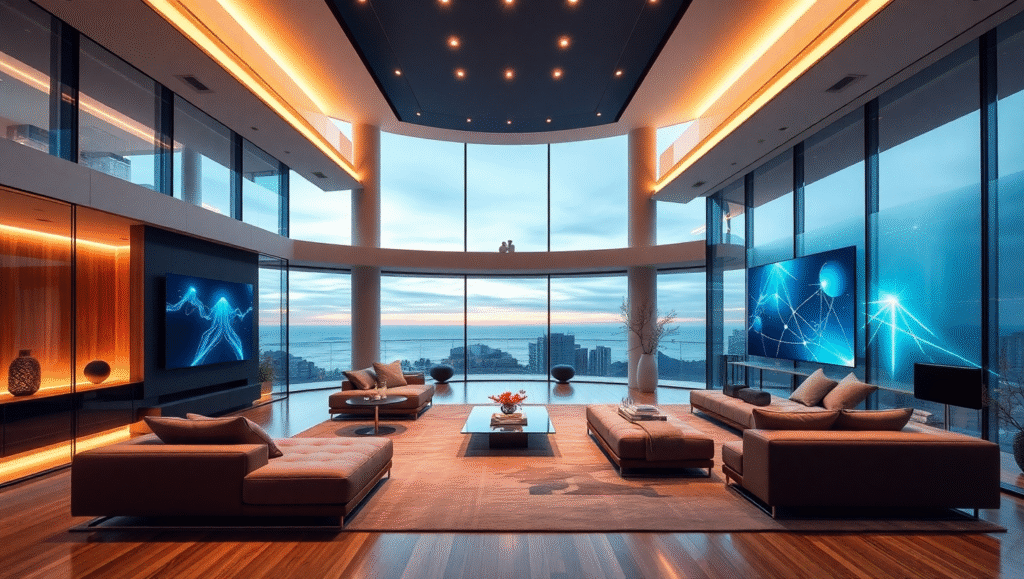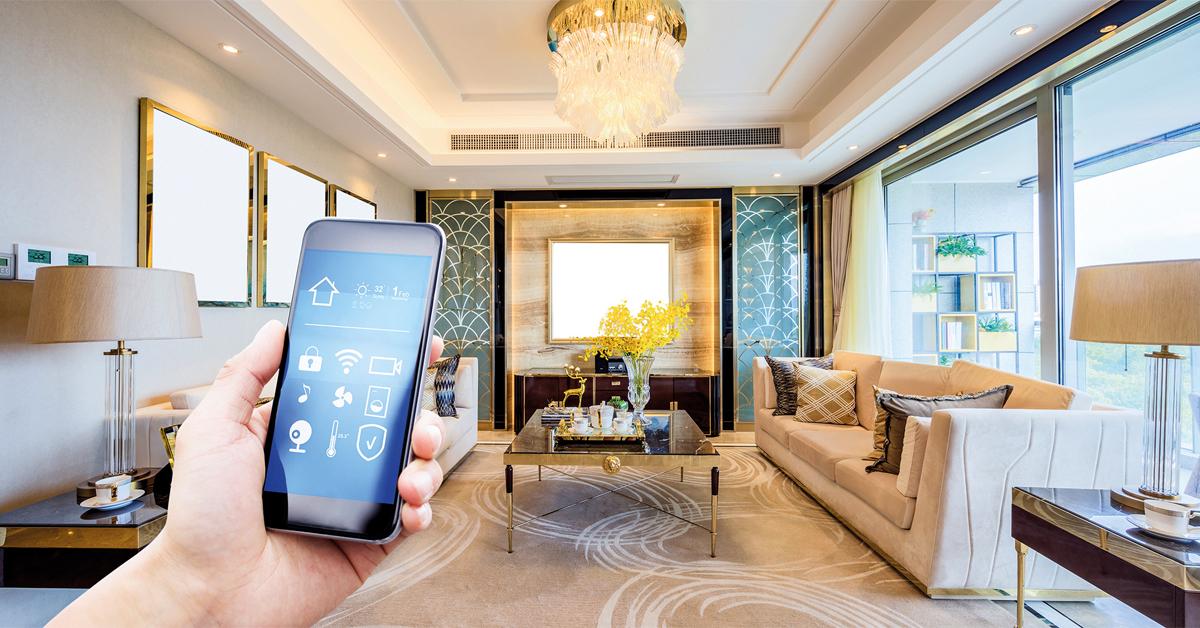Smart homes are transforming modern luxury living by blending cutting-edge technology with convenience, security, and sustainability. From AI-powered climate control to voice-assisted automation, today’s luxury homes are less about square footage and more about intelligence. This article explores how smart technology is elevating the meaning of luxury living in the United States, answering common questions and showcasing real-world examples that highlight comfort, efficiency, and future-forward design.
Introduction: Why Smart Homes Define Luxury in 2025
For decades, luxury living was synonymous with sprawling estates, high-end finishes, and prime real estate locations. But in 2025, the very definition of luxury has evolved. Increasingly, affluent homeowners are seeking homes that are not only beautiful but also intelligent. Smart homes—equipped with interconnected devices, artificial intelligence (AI), and sustainable systems—are setting the new benchmark for prestige.
According to Statista, the U.S. smart home market is projected to reach more than $53 billion by 2026, reflecting the rising demand for technology-infused living spaces. Buyers today are not only impressed by grand architecture; they’re also looking for personalized convenience, eco-friendly innovation, and intuitive automation that adapts to their daily lives.
Luxury, in essence, is no longer about having more—it’s about having smarter.
What Makes a Smart Home Truly “Luxury”?
Not every smart home qualifies as luxury. The true essence of a luxury smart home lies in how seamlessly technology integrates into everyday living. Instead of being a collection of disjointed gadgets, luxury smart homes offer a unified ecosystem that enhances lifestyle in meaningful ways.
Some of the defining features include:
- Smart Climate Control – Automated systems that adapt heating, cooling, and air quality to homeowner preferences.
- Intelligent Security – Biometric locks, AI-powered surveillance, and facial recognition.
- Entertainment Ecosystems – Multi-room audio, immersive VR gaming, and smart theaters.
- Energy Efficiency – AI-optimized power usage, solar integration, and intelligent meters.
- Wellness-Oriented Tech – Smart mirrors, air purifiers, circadian lighting, and connected fitness devices.
Take, for example, Tesla’s Solar Roof and Powerwall system, which provides uninterrupted clean energy for large estates. For high-net-worth individuals, combining sustainability with luxury is no longer a compromise—it’s an expectation.
How Are Smart Homes Changing Luxury Lifestyle Expectations?
Luxury used to mean material abundance. Today, it means effortless living. Smart homes allow homeowners to live with more convenience, customization, and peace of mind, redefining what it means to enjoy a modern lifestyle.
Convenience
Imagine arriving home after a long day and your lights adjust to your mood, your thermostat warms the room to your preferred temperature, and your favorite playlist begins softly in the background—all without lifting a finger. This is the promise of smart luxury living.
Customization
Smart kitchens suggest recipes based on your health goals. Smart mirrors analyze your skin and recommend beauty treatments. Lighting adjusts to align with your circadian rhythm for better sleep.
Status Symbol
Owning a fully automated luxury home is today’s equivalent of driving a Ferrari or owning a private jet. In affluent neighborhoods of Los Angeles, New York, and Miami, developers advertise home automation systems more prominently than pools or gyms.
Sustainability
High-end living is increasingly tied to eco-consciousness. Wealthy homeowners now prefer smart irrigation systems, like Rachio, that save water while maintaining lush landscapes. Sustainability has become a badge of luxury, not a sacrifice.
A real-life example comes from Beverly Hills, where developers now emphasize smart features like voice-controlled lighting and AI security systems in brochures, marking a shift in what buyers perceive as luxury value.
Are Smart Homes More Secure Than Traditional Luxury Homes?
Security is a cornerstone of luxury. Smart homes elevate it with advanced monitoring and AI-driven defense systems, but they also introduce new risks such as cybersecurity vulnerabilities.
Security Enhancements
- AI-enabled facial recognition ensures only trusted individuals gain access.
- Remote monitoring allows owners to check their properties from anywhere in the world.
- Biometric authentication adds an additional layer of protection.
- Geofencing arms or disarms alarms automatically based on location.
For instance, Ring’s Video Doorbell Elite integrates with Amazon Alexa, allowing homeowners to monitor packages and visitors from abroad.
Security Concerns
- Hackable IoT devices pose potential entry points for cybercriminals.
- Data privacy remains an issue as devices store personal usage patterns.
- Over-dependence on cloud services may create vulnerabilities.
This is why many luxury homeowners are hiring cybersecurity consultants to safeguard their digital environments—blurring the line between physical and digital security.
How Do Smart Homes Improve Sustainability in Luxury Living?
One of the biggest shifts in luxury real estate is the demand for green luxury. Homeowners no longer see sustainability as a trend—it’s now a lifestyle requirement.
Sustainability Enhancements
- Smart Thermostats (Nest, Ecobee): These reduce utility costs by up to 20%.
- Smart Irrigation Systems: Conserve thousands of gallons of water per year.
- AI-Driven Lighting: Adjusts to daylight levels and activity, reducing waste.
- Solar Integration: Combined with storage systems like Tesla Powerwall.
A homeowner in San Francisco cut monthly energy bills by 40% after integrating AI-powered HVAC with rooftop solar panels, demonstrating how eco-luxury is both practical and aspirational.

Which Smart Home Features Do Luxury Buyers Value Most?
Luxury buyers are increasingly seeking integrated, invisible technology—automation that enhances the experience without being intrusive.
Some of the most requested features include:
- Whole-home automation for lighting, curtains, and temperature.
- Smart kitchens with AI-driven appliances.
- Automated garages with EV charging stations.
- Climate-controlled wine cellars with AI monitoring.
- AI wellness systems for air purification and water quality control.
In Miami luxury condos, residents can even enjoy AI concierge services that handle deliveries, schedule appointments, and manage reservations.
How Are Smart Homes Impacting U.S. Real Estate Value?
Smart homes aren’t just redefining lifestyle—they’re redefining the market itself.
- Premium Pricing: Zillow reports that homes with smart features command 5–10% higher sale prices.
- Faster Sales Cycles: Tech-forward homes often sell faster, particularly in younger buyer markets.
- Rental Demand: Luxury rentals with integrated smart features fetch premium rents.
In Austin, Texas, where tech executives dominate the market, homes with pre-installed smart systems are selling 30% faster than traditional properties.
Real-Life Case Studies of Luxury Smart Homes
Case Study 1: The Bel Air Smart Mansion
This $35 million estate features voice-controlled mood lighting, a smart infinity pool, biometric wine cellar access, and an AI wellness room equipped with oxygen monitoring.
Case Study 2: Manhattan Penthouse
Here, technology creates comfort through smart glass windows that tint with sunlight, AI-personalized soundscapes for stress reduction, and automated pet care systems for high-net-worth animal lovers.
Case Study 3: Sustainable Silicon Valley Estate
Built for a tech executive, this home integrates solar energy, Tesla EV charging stations, and smart greenhouses that produce organic vegetables year-round.
What Are the Future Trends in Luxury Smart Homes?
The future of smart luxury is poised to be even more immersive.
- AI Interior Designers: Algorithms will design furniture layouts that maximize space and style.
- Digital Twins: Virtual replicas of homes will predict maintenance needs before problems occur.
- Health-Integrated Homes: Real-time health monitoring connected to wearables.
- Autonomous Homes: Complete self-regulation of power, water, and waste.
In the near future, luxury living will mean residing in a self-sustaining ecosystem that anticipates your needs before you even express them.
FAQs: Smart Homes and Luxury Living
Q1. Are smart homes worth the investment for luxury buyers?
Yes, smart homes are worth it. They provide unmatched convenience, enhance security, and increase property value. For luxury buyers, these homes represent a blend of prestige and functionality, offering energy savings, sustainability, and cutting-edge design. They transform living spaces into intelligent ecosystems that adapt to personal lifestyles.
Q2. How much does it cost to make a home “luxury smart”?
Converting a home into a luxury smart home typically costs between $50,000 and $500,000 or more. Expenses vary based on technology choices, scale of automation, and customization. Features such as AI security, climate control, wellness systems, and entertainment hubs add to both installation costs and long-term property value.
Q3. Do smart homes require internet access?
Yes, smart homes rely heavily on internet connectivity to function smoothly. Most devices operate through Wi-Fi or cloud integration, ensuring real-time automation and monitoring. However, many high-end systems include backup LTE, fiber, or satellite connections to maintain functionality during outages, offering uninterrupted convenience, security, and performance for homeowners.
Q4. Are smart devices hackable?
Smart devices can be vulnerable to hacking if not properly secured. Cybercriminals may exploit weak passwords or unsecured networks. To minimize risks, homeowners should use strong encryption, VPNs, firewalls, and professional cybersecurity audits. High-end luxury systems often come with enhanced privacy protections, offering additional layers of digital safety.
Q5. Do smart homes work during power outages?
Yes, luxury smart homes are often equipped with backup power solutions like Tesla Powerwall or advanced generators. These ensure critical systems—such as security, climate control, and lighting—remain operational during outages. With sustainable energy integration, homes can maintain full functionality and comfort, even when the grid goes down.
Q6. Do they save money long-term?
Absolutely. While upfront costs can be high, smart homes generate significant long-term savings through optimized energy use, water conservation, and reduced utility bills. Features like AI thermostats, smart irrigation, and efficient lighting reduce waste. Over time, the financial savings often offset installation costs, making them an attractive investment.
Q7. Are voice assistants safe for privacy?
Voice assistants carry potential privacy risks since they collect and process user data. However, many luxury systems now feature advanced encryption, local data storage, and customizable privacy settings. Homeowners can strengthen protection by disabling unnecessary features and using secure networks. With proper precautions, privacy risks can be minimized.
Q8. Do luxury hotels use smart home tech?
Yes, luxury hotels increasingly integrate smart technologies to enhance guest experience. Many premium chains use automated lighting, smart thermostats, app-based room controls, and even AI-powered concierge services. These features improve comfort, energy efficiency, and personalization, offering guests a taste of smart living similar to high-end residences.
Q9. Will smart homes replace traditional luxury?
Not entirely. Traditional luxury elements—like prime locations and premium materials—will always matter. However, smart technology is becoming the new baseline for high-end living. In the future, a property without automation may feel outdated. Luxury will be defined by blending classic elegance with modern, intelligent home technologies.
Q10. Can they be eco-friendly without compromising comfort?
Yes, smart homes can achieve sustainability while maintaining ultimate comfort. Automated climate control, water-saving irrigation, and AI-driven lighting reduce environmental impact. At the same time, advanced systems ensure comfort by adjusting settings to personal preferences. Eco-luxury blends technology and environmental responsibility, creating a balance between indulgence and green living.
Conclusion: The Future of Luxury Living Is Intelligent
Smart homes are not a passing trend—they’re the future of luxury living. For today’s wealthy homeowners, the fusion of intelligence, sustainability, and personalization is redefining prestige. From AI-powered climate control to eco-conscious automation, luxury homes in 2025 are designed to think, adapt, and anticipate needs.




